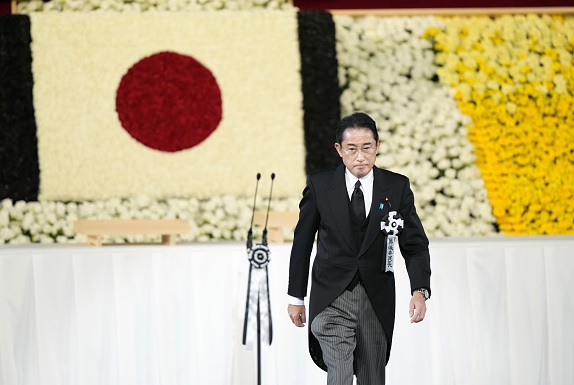
(Photo : NHK)
Former PM Kishida's Bid to Retain Influence in LDP
In a move likely to stir diplomatic tensions, Japanese Prime Minister Fumio Kishida made a ritual offering to the contentious Yasukuni Shrine on Thursday, coinciding with the 79th anniversary of Japan’s surrender in World War II. The shrine, long associated with Japan’s wartime aggression, remains a flashpoint in the nation’s relations with its neighbors.
Kishida’s offering, known as Tamakushi fees, was made in his role as president of the ruling Liberal Democratic Party (LDP). This gesture, reported by Xinhua news agency, underscores the complex balancing act Kishida faces between honoring domestic political traditions and managing Japan’s international relationships, particularly with China and South Korea. The shrine enshrines 14 Class-A war criminals from World War II, and any official association with it is seen as a glorification of Japan's militaristic past.
What adds intrigue to this development is Kishida’s recent announcement that he will not seek re-election as LDP president next month, signaling the end of his three-year tenure as Prime Minister. This decision, which surprised many, casts a shadow over his legacy and raises questions about the future direction of Japan’s leadership.
Although Kishida himself did not visit Yasukuni Shrine, several prominent LDP lawmakers did, including Shinjiro Koizumi, the son of former Prime Minister Junichiro Koizumi. Their visits highlight the ongoing influence of nationalist sentiment within Japan’s ruling party, despite the shrine’s controversial history.
The Yasukuni Shrine has long been a source of tension in East Asia, particularly with China and South Korea, countries that suffered under Japanese occupation during the war. Diplomatic protests frequently follow any official visit or offering to the shrine, as these acts are perceived as a denial of the atrocities committed during Japan’s militaristic expansion.
Kishida’s offering, therefore, is not just a ceremonial act but a politically charged move that could exacerbate regional frictions. It also reflects the broader challenges facing Japan as it navigates its post-war identity, balancing nationalist impulses with the need for diplomatic reconciliation.
As Japan approaches a leadership transition, how the next Prime Minister handles such sensitive issues will be crucial. Kishida’s decision not to run for re-election may pave the way for a leader with a different approach to Japan’s historical controversies, potentially impacting the country’s diplomatic posture in the region.
* This is a contributed article and this content does not necessarily represent the views of btin.co.in









